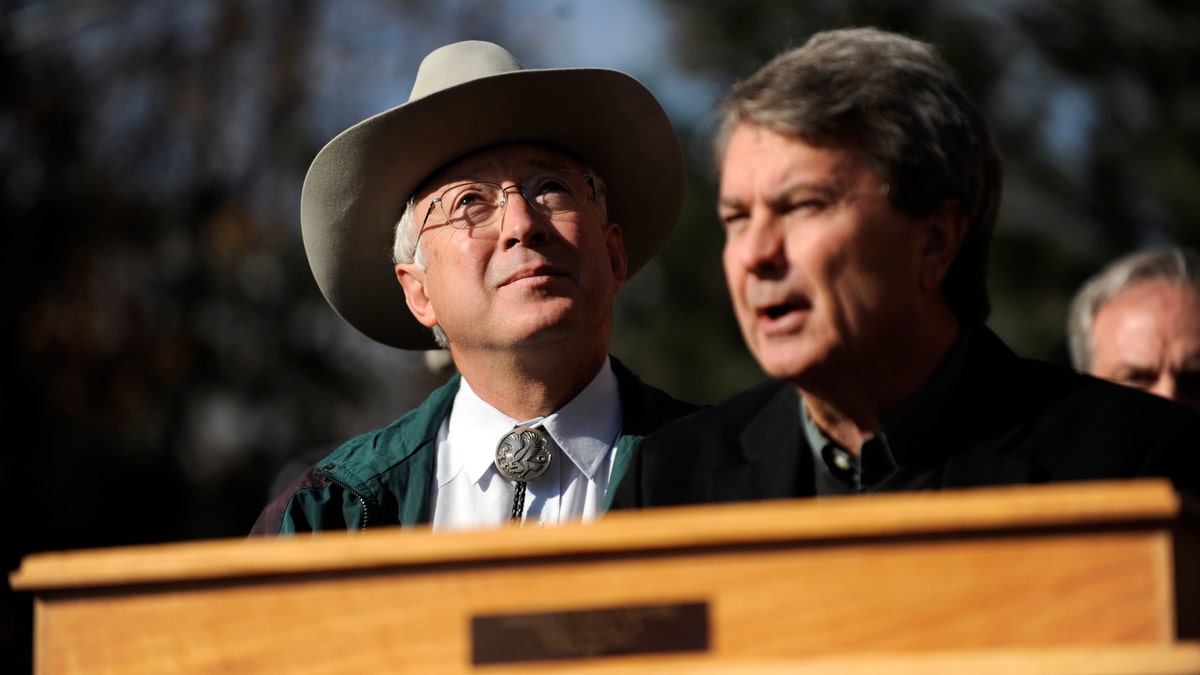
Secretary of the Interior Ken Salazar watches geese fly overhead as Bureau of Land Management Director Bob Abbey speaks about an initiative that would allow the BLM to designate and protect wilderness areas on Thursday, Dec. 23, 2010 outside of REI in Denver. (AP)
The Obama administration's decision this week to reverse a Bush-era policy and restore eligibility for federal wilderness protection to millions of undeveloped acres of land has outraged Republicans who plan to challenge the move once they take control of the House next month.
"We all love surprises at Christmas time, but I am pretty sure this is not what any of us had in mind," said Rep. Jason Chaffetz, R-Utah, who says that more than two-thirds of his congressional district is owned or controlled by the federal government.
"I am deeply disappointed in the administration's actions," he said in a written statement. "It has proven once again that it has a tin ear when it comes to our public lands."
Chaffetz said he and his colleagues on the House Natural Resources Committee and in the Congressional Western Caucus will "demand an accounting."
The Interior Department is replacing the 2003 policy adopted under former Interior Secretary Gale Norton. That policy -- derided by some as the "No More Wilderness" policy -- stated that new areas could not be recommended for wilderness protection by the U.S. Bureau of Land Management, and it opened millions of acres to potential commercial development.
That policy "frankly never should have happened and was wrong in the first place," Interior Secretary Ken Salazar said Thursday during the announcement of the policy change.
Environmental activists have been pushing for the Obama administration to restore protections for potential wilderness areas.
Salazar said the agency will review some 220 million acres of BLM land that's not currently under wilderness protection to see which should be given a "Wild Lands" designation -- a new first step for land awaiting a wilderness decision. Congress would decide whether those lands should be permanently protected, Salazar said.
But Republicans pounced on the "Wild Lands" announcement as an attempt by the Obama administration to close land to development without congressional approval.
"This backdoor approach is intended to circumvent both the people who will be directly affected and Congress," said Washington Rep. Doc Hastings, a Republican tapped to lead the House Natural Resources Committee starting next month.
The Congressional Western Caucus, an all-Republican group, also blasted the decision.
"This is little more than an early Christmas present to the far left extremists who oppose the multiple use of our nation's public lands," Utah Rep. Rob Bishop said in a statement.
BLM Director Bob Abbey said it hasn't been decided how many acres are expected to be designated as "Wild Lands" and whether those acres will be off-limits to motorized recreation or commercial development while under congressional review. It's also unclear whether there will be a time limit on how long acres can be managed as "Wild Lands" before a decision is made on their future.
The BLM has six months to submit a plan for those new wilderness evaluations.
These "Wild Lands" would be separate from Wilderness Study Areas that must be authorized by Congress. Wild Lands can be designated by the BLM after a public planning process and would be managed with protective measures detailed in a land use plan.
Ranchers, oil men and others have been suspicious of federal plans to lock up land in the West, worrying that taking the BLM land out of production would kill rural economies that rely on ranchers and the oil and gas business.
Their suspicions have been heightened since memos leaked in February revealed the Obama administration was considering 14 sites in nine states for possible presidential monument declarations.
That included 2.5 million acres of northeastern Montana prairie land proposed as a possible bison range, along with sites in Colorado, Utah, New Mexico, California, Nevada, Arizona, Oregon and Washington.
The 2003 policy was an out-of-court deal struck between Norton and then-Utah Gov. Michael Leavitt to remove protections for some 2.6 million acres of public land in that state.
The policy allowed drilling, mining and other commercial uses on land under consideration as wilderness areas.
Salazar's reversal doesn't affect about 8.7 million acres already designated as wilderness areas.
Conservationists praised the reversal, though there has been grumbling that it took the Obama administration nearly two years to overturn the Bush-era policy.
"Washington D.C. always takes longer than you want, but we're glad we've gotten here," said Suzanne Jones, regional director for The Wilderness Society.
The Associated Press contributed to this report.












































